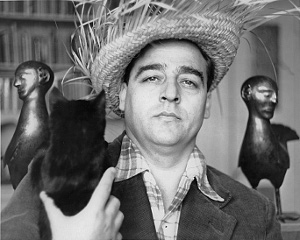A Quote by Kenneth Patchen
The question is not: do we believe in God? but rather: does God believe in us? And the answer is: only an unbeliever could have created our image of God; and only a false God could be satisfied with it.
Related Quotes
I believe the word "infidel" is not particular to any religion. I believe we are all created in the image of God, in fact, we are all God, or at one with God, at our deepest core essence. I think "infidel" refers to one who does not believe that God is none other than the Self. The "infidel" is the individual personality who identifies with the body and thoughts and not the Divine Indweller. Therefore we are all "infidels" save the sacred few who have transcended the notion of the limited self. The ancient mystics of all tradtitions have said this.
I believe in Islam. I am a Muslim and there is nothing wrong with being a Muslim, nothing wrong with the religion of Islam. It just teaches us to believe in Allah as the God. Those of you who are Christian probably believe in the same God, because I think you believe in the God Who created the universe. That's the One we believe in, the One Who created universe - the only difference being you call Him God and we call Him Allah. The Jews call Him Jehovah. If you could understand Hebrew, you would probably call Him Jehovah too. If you could understand Arabic, you would probably call Him Allah.
God will never disappoint us… If deep in our hearts we suspect that God does not love us and cannot manage our affairs as well as we can, we certainly will not submit to His discipline. …To the unbeliever the fact of suffering only convinces him that God is not to be trusted, does not love us. To the believer, the opposite is true.
Our obedience is God's pleasure when it proves that God is our treasure. This is good news, because it means very simply that the command to obey is the command to be happy in God. The commandments of God are only as hard to obey as the promises of God are hard to believe. The Word of God is only as hard to obey as the beauty of God is hard to cherish.
When we believe that we ought to be satisfied, rather than God glorified, we set God below ourselves, imagine that He should submit His own honor to our advantage; we make ourselves more glorious than God, as though we were not made for Him, but He made for us; this is to have a very low esteem of the majesty of God.
I believe in God. Maybe not the Catholic God or even the Christian one because I have a hard time seeing any God as elitist. I also have a hard time believing that anything that created rain forests and oceans and an infinite universe would, in the same process, create something as unnatural as humanity in its own image. I believe in God, but not as a he or she or an it, but as something that defines my ability to conceptualize within the rather paltry frames of reference I have on hand.
What it does remind us is that 'God' is not to be separated from the quest for the Kingdom of God and is not and cannot be the object of any detached 'scientific' contemplation. Heidegger's critique of onto-theology is also driving a wedge between speaking of God and the aims of science - not so as to get rid of God but rather to free God from a false objectification.
There are two gods. The god our teachers teach us about, and the God who teaches us. The god about whom people usually talk, and the God who talks to us. The god we learn to fear, and the God who speaks to us of mercy. The god who is somewhere up on high, and the God who is here in our daily lives. The god who demands punishment, and the God who forgives us our trespasses. The god who threatens us with the torments of Hell, and the God who shows us the true path.
There are two gods. A god who casts us off because of our sins, and a God who calls to us with His love.
God created us in joy and created us for joy, and in the long run not all the darkness there is in the world and in ourselves can separate us finally from that joy, because whatever else it means to say that God created us in His image, I think it means that even when we cannot believe in Him, even when we feel most spiritually bankrupt and deserted by Him, His mark is deep within us. We have God's joy in our blood.






































